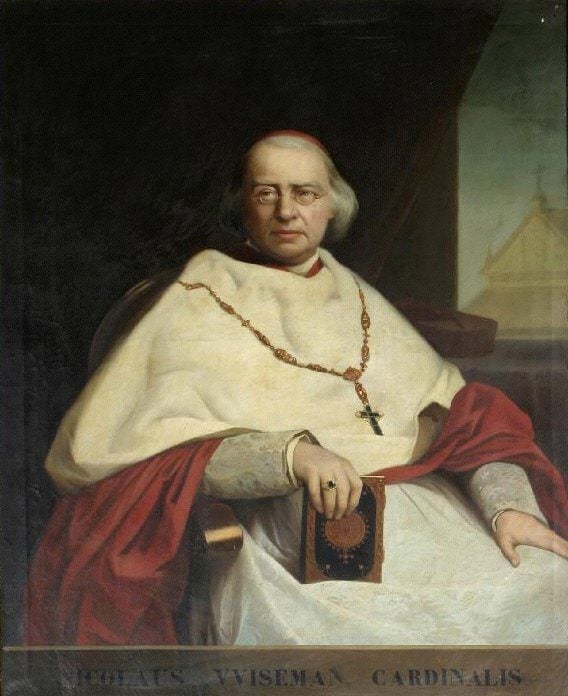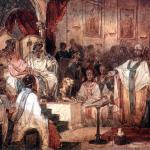
It’s amazing what can be found in Holy Scripture, if you dig deep enough.
***
Nicholas Cardinal Wiseman (1802-1865) made the following brilliant argument:
Acts 2:41 So those who received his word were baptized, and there were added that day about three thousand souls.
We read, in the Acts of the apostles, of three, or five, and more thousands, being converted in one day, and admitted to baptism. Does this possibly allow us to imagine, that they were all instructed in detail, in all the mysteries of religion? By baptism, it was understood, that they were received into perfect communion with the faithful. Can we, therefore, suppose, that all these thousands who were baptized immediately, had time to go through the minute and detailed examination of the specific doctrines presented to their acceptance by the apostles? The very words of the Scripture text are at variance with this opinion, for it speaks of these conversions as being instantaneous.
But then there must have been some compendious principle; there must have been some ground on which they were received into Christianity, which involved in itself their admission, when taught, of whatever should be explained to them by those who converted them. You cannot possibly suppose that they were called upon individually, and in detail, to examine every doctrine of Christianity; but there must have been, as I said before, some principle, some confession of faith, exacted from them, which secured their subsequent adhesion to every doctrine that should be taught, otherwise it would have been profaning the solemn rite and sacrament of baptism, to have admitted men within the pale of the church, reserving to them the condition of afterwards retiring from it if, upon examination, they could not satisfy themselves that such was its doctrines.
Now imagine what you please, make what theory you prefer, you must come to this conclusion, that it was understood, that whatever should afterwards be explained to them by the apostles, they should be willing to receive. And, in fact, we do find this to have been the case in practice, because we find that the apostles subsequently made decrees, and published laws, regarding the practice of the church, and came to a decision as regards matter of belief and discipline, and that all the faithful instantly submitted to their decrees [Acts 16:4]; that all the faithful seemed to have considered them from the beginning, not merely as teachers, but absolutely as superiors, to whose authority they were obliged to bow.
And this, therefore, explains at once the difficulty, and shows us the principle upon which the early Christians were received into the church. It was upon an understanding, upon giving a sufficient pledge, that they were ready to embrace Christianity as a system of doctrines, without individual examination; from being satisfied of the first step being right—that is, the principle of authority invested in the apostles—they were willing, and would be obliged to receive, whatever came afterwards from their mouths.
Now apply this, if you please, to the two rules of faith; and suppose a missionary arriving in a foreign country—in a country where the name of Christ was unknown—and suppose him, therefore, advancing with the rule, that it was necessary to read the Bible; that it is necessary to satisfy each one’s mind on all that is to be believed, I ask you could he, by one discourse convert—or, at least if he did not change their minds, could he, after one discourse, receive, simply by the rite of baptism, thousands into the religion of Christ; and would he be satisfied in himself, that he had made true converts who would not go back from the faith they had embraced?
I am sure any one who is conversant with the practice of modern missions, will be satisfied, that no missionary, from any but a Catholic church, would venture to receive persons, so slightly instructed into religious communion, or would feel satisfied that they would persevere in the faith which they had adopted.
But Catholics can do this, and they have done it in every age up to this day; for they have been satisfied—they have considered any person as truly in heart a Catholic, and as having implicitly received all the doctrines of the Catholic religion, when he has once given up his belief in his own individual guidance, and adopted the principle, that whatever the Catholic church shall teach him must be true.
While, therefore, so far as we know from the history of their own writings, and from the conduct of the apostles, we cannot find the slightest hint, that the Scriptures of the New Testament was to be the rule of faith, we find a course pursued by them necessarily supposing the Catholic principle of authority, and of an infallible teaching in the church of God.
(Lectures on the Doctrines and Practices of the Roman Catholic Church, London: J. S. Hodson, 1836, pp. 88-89)
Cardinal Wiseman is almost as great and original of a thinker as Cardinal Newman, which explains, I suppose, how Newman could be stumbled by him and first led down to the road to the Church, as a result of reading his writing. It was Cardinal Wiseman who made an argument from analogy: comparing Anglicans to the ancient heresies and schisms. This got Newman to thinking about comparative ecclesiology and development of doctrine, and these proved to be his downfall as an Anglican.
These and similar arguments put an end to my Protestantism as well, 145 years later . . .
C. S. Lewis [see the article on him below] said that his biggest gripe against the Catholic Church (or a very big one, at any rate) was that you don’t accept merely what it teaches now, but also what it will in the future.
Well, here is a stunning biblical proof of exactly what he objected to, so that we can show that such a thing was exactly the rule of faith in apostolic times.
Related reading:
***
(originally 1-10-12)
Photo credit: Cardinal Nicholas Wiseman, by Eduardo Cano (1823-1897) [public domain / Wikimedia Commons]
***













